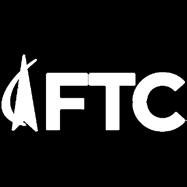JULY/AUGUST 2024

From earning grades to earning wages


JULY/AUGUST 2024

From earning grades to earning wages

By Shirley Bloomfield, CEO NTCA–The Rural Broadband Association
NTCA members are committed to protecting you
Everyone should take cybersecurity seriously, managing passwords and being aware of all the possible threats to your personal information, finances and more. That’s not meant to frighten you, because you do have help. NTCA member providers across the nation take your security as seriously as you do, and they work daily to secure the networks bringing you the critical internet-based services you need. Recently, I had the opportunity to share more about NTCA’s cybersecurity efforts for both consumers and broadband providers, including CyberShare: The Small Broadband Provider ISAC, through a meeting with U.S. Cybersecurity and Infrastructure Security Agency Director Jen Easterly.
CISA recently launched the Secure Our World program to raise awareness about cybersecurity best practices and empower the public to take proactive steps to protect themselves online. Resources available to the public include a public service announcement, tip sheets on topics like phishing, multifactor authentication and the importance of creating strong passwords and updating software. And there is even a bingo board to make this critical topic engaging for the youngest internet users.
Also, Cybersecurity Awareness Month each October highlights these important issues and emphasizes that you’re also part of the team helping keep us all safe. While NTCA members work behind the scenes, you can help by recognizing phishing attempts, choosing strong passwords and more. Visit cisa.gov/secure-ourworld for more.
Together, we’ll help keep everyone safe and secure online.
From work and school to games and streaming entertainment services, access relies on passwords. The U.S. Cybersecurity and Infrastructure Security Agency suggests you consider using a reliable tool to manage these key bits of information — password managers.
Memorizing complex passwords for multiple accounts is difficult, or impossible. So, sometimes passwords are too simple and easily hacked. Password managers, though, can help.
A password manager is a software tool that organizes all your passwords. Then, a single master code unlocks this vault — encouraging use of long, complex passwords.
Web browsers, including Safari, Chrome and Edge, have built-in password managers, and these can be accessed across devices like computers and phones. These may suffice for those with only basic needs, but they are limited. For instance, passwords in Apple’s Safari aren’t accessible on an Android phone running Google Chrome.
For more robust options, there is software like LastPass, 1Password and Bitwarden. These work across multiple types of devices and have additional features, such as the ability to generate passwords and integration into your favorite web browser.
Make your master password long, reliable and unique. Sixteen characters is recommended. Also, regularly review your stored passwords to remove passwords for accounts you no longer use.

Readers today can find themselves facing a technological conundrum. While many book lovers treasure traditional books, electronic devices, designed to make reading more comfortable and accessible, are hard to ignore.
For some, there’s nothing like the sensation of holding a book and feeling the paper as the pages turn. Printed books will always have emotional, if not monetary, value as collectibles. And they certainly aren’t going anywhere.
These days there are countless options of things to download and read on our phones and tablets, but dedicated, handheld electronic book readers, often called e-readers, offer text and lighting customizations and many other conveniences to enhance the reading experience. Nonreflective, electronic-ink displays give them a paper-like look and make it easier to read outdoors compared with reading on a phone or tablet. And, dedicated e-readers present fewer distractions — you won’t be interrupted by notifications, calls or texts.
Over the past few years, the price of e-readers has fallen while the hardware has improved. High-end features, such as backlit, high-resolution screens and waterproofing, are standard. If you don’t have an e-book reader, there’s never been a better time to invest in one.
• Portability: E-readers are lightweight and can store thousands of books.
• Customization: Most allow you to adjust the font and size, background
lighting, etc. They can make reading accessible for individuals with visual impairment by providing text-to-speech and other customizations.
• Searchability: E-readers’ built-in search functions mean you can easily find a favorite quote or passage in the book.
• Built-in resources: Dictionaries and thesauruses allow for immediate definitions.
• Environmentally friendly and affordable: No trees are harmed in e-book production, and they usually cost much less than traditional books.
Amazon Kindle is synonymous with e-reader for good reason. According to both Wired magazine and The New York Times’ Wirecutter, the Kindle is the most affordable, best and easiest choice for reading electronic books.
• Amazon Kindle: With a 6-inch screen and a high pixel density for sharper text, the least expensive Kindle — around $100 on Amazon — offers just about all the advantages of the more expensive e-readers. If you’re planning on reading outdoors this summer, it’s worth the extra charge, roughly $50, to upgrade to the waterproof Kindle Paperwhite with its better lighting options.
• Rakuten Kobo: Japanese retailer Rakuten currently offers six Kindlecomparable e-readers ranging from $110 to $400. The Libra 2 has a physical page-turn button and Bluetooth
support, so you can connect headphones and listen to audiobooks.
• Barnes & Noble Nook: The book retailer’s e-reader features a touch screen and page-turning button, as well as the ability to annotate and highlight text. The devices start around $100. As an added perk, Nook owners can read the complete contents of any book for free while in stores for one hour per day.
Once you’ve settled on an e-reader, where do you find the books? Amazon, Barnes & Noble and Kobo all sell tomes to download to their specific e-readers. But you could read for years without having to spend another dime. Sources of free e-books include:
• OverDrive.com, used by 43,000 libraries and schools worldwide, allows anyone with a library card to pull e-books, magazines and audio books.
• Project Gutenberg, a library of more than 70,000 free e-books to download or read online. Thousands of volunteers digitize and proofread the books available at gutenberg.org.
• Mybookcave.com
• Planetebook.com
• ManyBooks.net
• OpenLibrary.org
• GetFreeEbooks.com
Doyou ever get disheartened by the tone of our societal discourse? I do. We’ve become a country given to extremes. Both ends of our political spectrum tend to take a “my way or the highway” stand. It would seem that compromise, a founding principle of our nation, is no longer in fashion. The idea for this column began with thoughts of how glad I am that FTC’s founding members took a different approach. Working and sacrificing together, we ended up building one of the nation’s preeminent broadband networks that is good for all of our members.

FRED JOHNSON Chief Executive Officer
Over the Memorial Day weekend, I attended a memorial service where my parents are buried. Later that day, I caught the National Memorial Day Concert on PBS. The opening tribute to World War II veterans was especially moving, as it closely mirrored my father’s experiences during 11 months of combat from Normandy to Berlin. I never fail to be humbled by the price those who answered the call to service paid for our freedoms.
Our present political discourse emanates, at least partly, because many put party before country. Some do this because they’ve honestly lost faith in the American dream. Some act merely out of a concern for no one other than themselves. In any case, it has led to irreconcilable extremes and that is very dangerous. At some point, on some issue, all of us will find ourselves in the minority. It helps to have guardrails that keep us safe in those moments. Unfortunately, the scariest reality is that we are more divided as a people than at any point since the Civil War.
Frankly, it will take courageous leadership from all those who represent us to prevent another catastrophe. I know many of the people who represent Alabama, and they are honorable men and women. But the majority of Americans must demand honorable action from all those who represent the people. Ultimately, that is the only solution. The sacrifice of millions of Americans in the cause of freedom demands no less. A good place to start would be reminding our leaders of the words Abraham Lincoln uttered from a battlefield upon which another great conflict among Americans was largely settled:
“But, in a larger sense, we cannot dedicate — we cannot consecrate, we cannot hallow — this ground. The brave men, living and dead, who struggled here, have consecrated it, far above our poor power to add or detract. The world will little note, nor long remember what we say here, but it can never forget what they did here. It is for us the living, rather, to be dedicated here to the unfinished work which they who fought here have thus far so nobly advanced. It is rather for us to be here dedicated to the great task remaining before us—that from these honored dead we take increased devotion to that cause for which they gave the last full measure of devotion — that we here highly resolve that these dead shall not have died in vain — that this nation, under God, shall have a new birth of freedom — and that government of the people, by the people, for the people, shall not perish from the Earth.”
FTC is the state’s largest member-owned provider of telecommunications services. It serves Northeast Alabama with a robust broadband network using world-class optical fiber technology.
Telecommunications Cooperative, Inc.
P.O. Box 217 • 144 McCurdy Ave. N. Rainsville, AL 35986
Telephone: 256-638-2144 www.farmerstel.com
BOARD OF TRUSTEES
Randy Wright, President Flat Rock Exchange
Garry Smith, Vice President Fyffe Exchange
Danny R. Richey, Secretary Geraldine Exchange
Lynn Welden, Treasurer Bryant Exchange
Kenneth Gilbert Pisgah Exchange
Gregg Griffith Henagar Exchange
Randy Tumlin Rainsville Exchange

The 2024 $3,000 FTC Scholarship recipients are Carlos Mann and Darby Culpepper.

CARLOS is a graduate of Geraldine High School, where he was an all-state football player for two years and played on the school’s basketball team. As a member of the Fellowship of Christian Athletes, he led devotions for the group. Carlos is also a food pantry volunteer, a football mentor and has worked at youth football and basketball camps. He plans to attend Shorter College in Rome, Georgia, and major in business management with a concentration in sales to pursue a career in pharmaceutical sales.

The $2,500 Foundation for Rural Service Scholarship goes to Ephan Benjume.
EPHAN graduated with honors and as valedictorian from Plainview High School. He was voted class president, Mr. Plainview and most likely to succeed. He was a member of Mu Alpha Theta, Beta Club, Good Samaritan Club, Club 36 and served as an FCA leader. Ephan received a Presidential Scholarship from Auburn University, where he will attend classes in the fall.
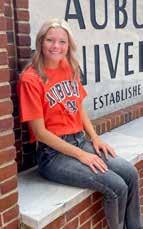
DARBY is a student at Auburn University, and she is on track to graduate with a B.S. in early childhood education in May 2025. She has earned an associate degree from Northeast Alabama Community College, where she was a member of the Mustang Leadership Academy.
Darby graduated at Cornerstone Christian Academy in Rainsville as salutatorian.
At Auburn, she is a Diamond Doll, serving as an official hostess of the Auburn baseball program. She volunteers with the Auburn Eagles Program, Miracle League of East Alabama, GLOW Foundation, Operation Christmas Child and Ponderosa Bible Camp.
Foundation for Rural Service Youth Tour recipients are Chloe Myrick and Colton Campbell.
Chloe and Colton earned a five-day trip to Washington, D.C., where they toured the nation’s capital, learned about legislative and agency processes, and explored the important role of broadband services in rural communities.
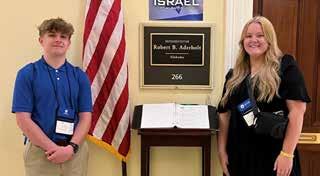
CHLOE attends Fyffe High School.
COLTON is a student at Ider High School.
FTC offices will be closed Thursday, July 4, in observance of Independence Day. Have a fun and safe holiday!


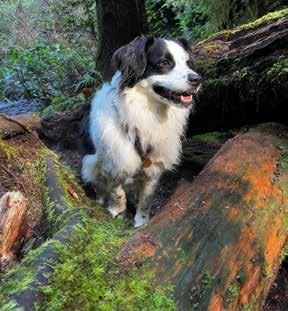
Story by KATHY DENES
Summer typically means travel time, whether scenic road trips or flights to vacation destinations. And more than ever before, beloved pets are tagging along for the ride.
Pet-friendly travel is a hot topic. It’s addressed by top vacation resources like Conde Naste Traveler, which has an online list of nationwide hotels and Airbnbs it deems best for accommodating pets, especially dogs. On travelandleisure.com, search “pets,” and you’ll unleash a wealth of helpful articles.
Even financial companies are weighing in.
NerdWallet compiled a list of Best Hotels for Pets in 2024, based on factors like fees and amenities, and rated air travel options, topped by Alaska Airlines. But if you don’t want to do the research yourself, there are travel agencies that specialize in planning and taking care of the details for you.
Hotels, resorts, parks and campgrounds usually post their pet policies, fees and amenities, as do airlines, trains and even cruise lines that allow passengers with paws. There are also numerous websites focused entirely on petfriendly travel, across the nation and around the world. Just browse by city, state or destination at resources such as:
• bringfido.com
• petswelcome.com
• tripswithpets.com





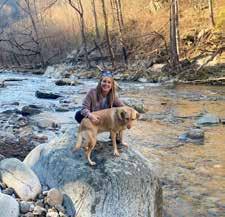

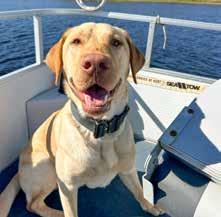


“Before deciding to bring your pet along on a trip, you need to ask yourself whether or not it’s in your pet’s best interest to do so,” says Dr. Rena Carlson, president of the American Veterinary Medical Association.
What’s a fun adventure for us might be overwhelming for our pets. “If you choose to include your pet, a pre-trip veterinary visit is a good idea, to make sure your pet is healthy and up to date on vaccinations and microchip registration, and to obtain a health certificate, which is required by law if you’re traveling to a different state with your pet,” Carlson says.
Your veterinarian can also provide vital information about the risk of parasites and other diseases that your pet may be exposed to at your destination, as well as possible preventive steps or treatments.
“Make sure to plan for their comfort in transit, whether by land or air, with regular breaks and by choosing the least stressful travel options,” Carlson says. “Confirm in advance that your destinations are pet-friendly, and try to maintain your pet’s routine as much as possible to help them feel secure. Your careful planning can ensure a safe and enjoyable trip for everyone involved.”

For more great tips for traveling with your pet, check out: pettravel.com petfriendlytravel.com avma.org
Whether taking your pooch along for a carriage ride in Charleston — child’s ticket required if Fido won’t fit in your lap — or entrusting it to doggie day care at Dollywood while you ride the Mystery Mine, the Southeast is loaded with places that welcome four-legged travel buddies.
Here are a few destinations that receive high marks from people traveling with their pets:
•Little River Canyon National Preserve atop Lookout Mountain in North Alabama welcomes dogs parkwide, but they must be leashed.
• Chattanooga has inviting options, from downtown patio dining and parks to mountain trails and attractions.
•Dinosaur World in Cave City extends a Kentucky welcome to leashed dogs and provides water stations.
•Barkwells, gated retreats in Asheville and Brevard, North Carolina, have dog-centric cabin and cottage rentals, each with a fenced yard and a range of amenities to make it a haven for both pets and people.
•For South Carolina excursions, check sciway.net’s pet travel guide for info on rentals, parks, beaches, eateries and more.
•St. Augustine, Florida, gets a nod from AAA for pet- friendly options, like strolls, visits to popular attractions and perhaps a stay at the historic Bayfront Marin House
by MELANIE JONES
When the DeKalb County Technology Center opened in 1974 as the DeKalb County Technical School, its students learned how to become mechanics, carpenters and secretaries. They stuck to traditional gender roles, and many people viewed the “trade school” route as a step down from college prep courses.
“Now it’s seen in a different light,” Director Jonathan Phillips says.
Today, thanks to dual enrollment programs, DeKalb County Technology Center graduates can earn more straight out of high school than many college graduates make. And tech center grads don’t have student loans to worry about as they embark on careers as plumbers, welders, electricians, cosmetologists and more.
These days, it’s not unusual to find boys enrolled in cosmetology or girls taking auto body classes. In fact, DeKalb County Technology Center’s Katelyn Lands is the reigning state champion in automotive refinishing technology. After the state competition, she moved on to
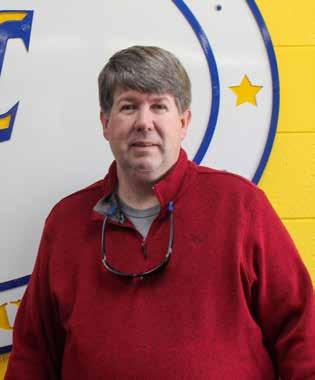
nationals, where she finished 16th out of 36 competitors.
The school is home to many other champions, as well. Jonathan says the school has had 82 SkillsUSA and HOSA-Future Health Professionals competitions champions since it opened 50 years ago. Graduate Bryce Mayes is the current national champion in masonry. Jonathan was a national finalist for Career and Technical Education Administrator of the Year after being named top educator in Alabama.

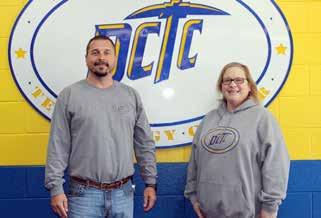
Students can also fine-tune their leadership skills through the tech center’s programs. Lara Roe, of Collinsville, is parliamentarian for the state SkillsUSA chapter. SkillsUSA represents more than 400,000 technical education students and instructors nationwide, starting in middle school and continuing through postsecondary institutions. Jonathan says a DeKalb County student has served in a state or national office in SkillsUSA for the past seven years, with five of those years as president.
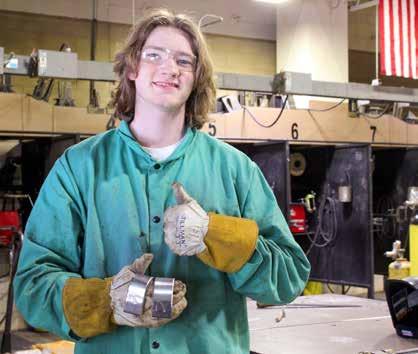
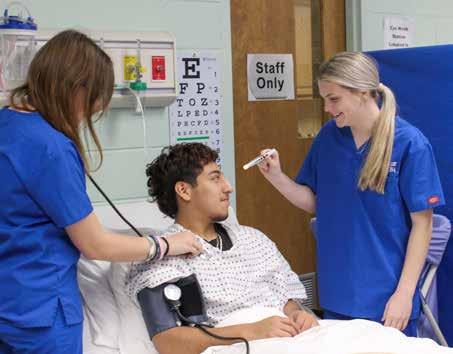
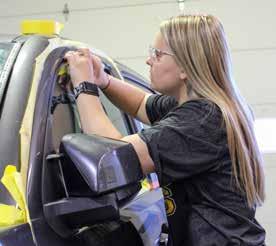

Jonathan is as proud of his faculty and staff as he is of his students. He says masonry instructor Scott Phillips is the Paul “Bear” Bryant of teachers. He has won more state awards in his career than any other teacher in the state. This year, he received a lifetime achievement award.
When Jonathan started teaching 22 years ago, there were 260 students enrolled in technical education courses. Today the program serves 2,700 students. “Now, we’re one of the largest programs in Northeast Alabama,” Jonathan says. “Per capita, we’re one of the largest in Alabama.”
A high percentage of tech center students go on to seek a postsecondary degree, whether at a two-year college, technical school or a four-year university.
To help give students a head start, the school offers the dual enrollment program. Several members of the technology center faculty are also adjunct professors at Northeast Alabama Community College, so students can go there outside of regular hours and earn college credit.
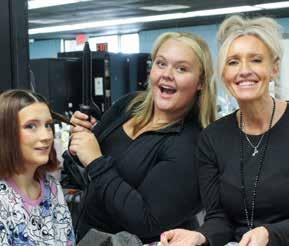
Upon graduation, students in the health sciences program can immediately earn the state certification necessary to work as a certified nursing assistant. On one spring day, all 17 students testing for CNA certification earned it on the first try. Health sciences graduates can become nationally certified as an EKG technician immediately after graduating from DeKalb County.
“They learn how to give reports, they learn real-world procedures,” instructor Paula Carroll says of her health sciences students.
Some students choose to earn two- or four-year degrees in the health field, Jonathan says, and some even decide to pursue advanced degrees. “If you want to work in the health field,” he says, “I think you need to start here.”
Other fields may not need postsecondary degrees. For example, Jonathan points to the welding program as the door to a great career. Students can finish the program, get nationally certified and earn $120,000 to $130,000 a year by the time they’re 20 or 21. “And they’re nowhere near the top of their earning potential,” Jonathan says.
CLOCKWISE FROM FAR LEFT:
Toby Swindall practices welding.
Hayden Noles gives a thumbs up after his welds pass a bend test.
Students Megan Henning, from left, Anthony Mil and Emma Dukes practice being in a hospital setting in Constance Stone’s Health Science Level 1 class, with Anthony playing the patient.
Instructor Nicki Wilks, right, works with student Alexia Fore to do Kaileigh Wehunt’s hair on prom day.
Mark Baltazar, left, and Crimson Ward participate in the SkillsUSA state competition.
Katelyn Lands is a state champion in auto finishing technology.
All that is possible without taking on the burdens of college loans. Former students have come back and shown Jonathan trucks they bought with cash or told him about the homes they bought before they turned 30. “A four-year degree is not necessary,” Jonathan says. “You can make a great living with certification and not have the debt. There are a lot of possibilities. We’re working every day to prepare students for a lasting career at a high wage.”
In fall 2024, DeKalb County Technology Center will offer the following fields of study:
• Auto body collision
• Auto mechanics
• Building construction
• Cosmetology
• Drafting/preengineering
• Fire science
• Law enforcement
• Masonry
• Medical science I, II and III
• Welding

Story by MELANIE JONES
Wearing a plaid shirt and a gray Froberg’s Farm cap, Tyler Froberg shares a cool fact about a favorite fruit with youthful viewers. “Every strawberry in the world is picked by hand,” he tells eager young minds. “And it takes half an hour to pick one row.”
Most fruit and vegetables are harvested by machines, which helps the fourth-generation farmer talk about farming as a STEAM — science, technology, engineering, arts and math — career option he promotes in a video for Lego’s education branch, known as Rebuilding the World with Agriculture.
Tyler has made a few videos for Lego, promoting schoolbased projects like building a strawberry-picking machine that won’t destroy the delicate fruit. But his screentime isn’t
limited to collaborations with Lego. As Farmer Froberg, Tyler has more than 780,000 social media followers learning about gardening, farming and life on a fruit and vegetable agritourism farm.
TEACHING THROUGH VIDEOS
When he first got out of the Army, Tyler worked on the family farm in Alvin, Texas. “I decided that I had my GI Bill, so I should probably go to college,” he says.
After earning a degree in agriculture, he worked for a year as an agriculture science teacher. “I loved it, and when you love something, you tend to be good at it, and when you tend to be good at it, you get recognition for it,” he says.
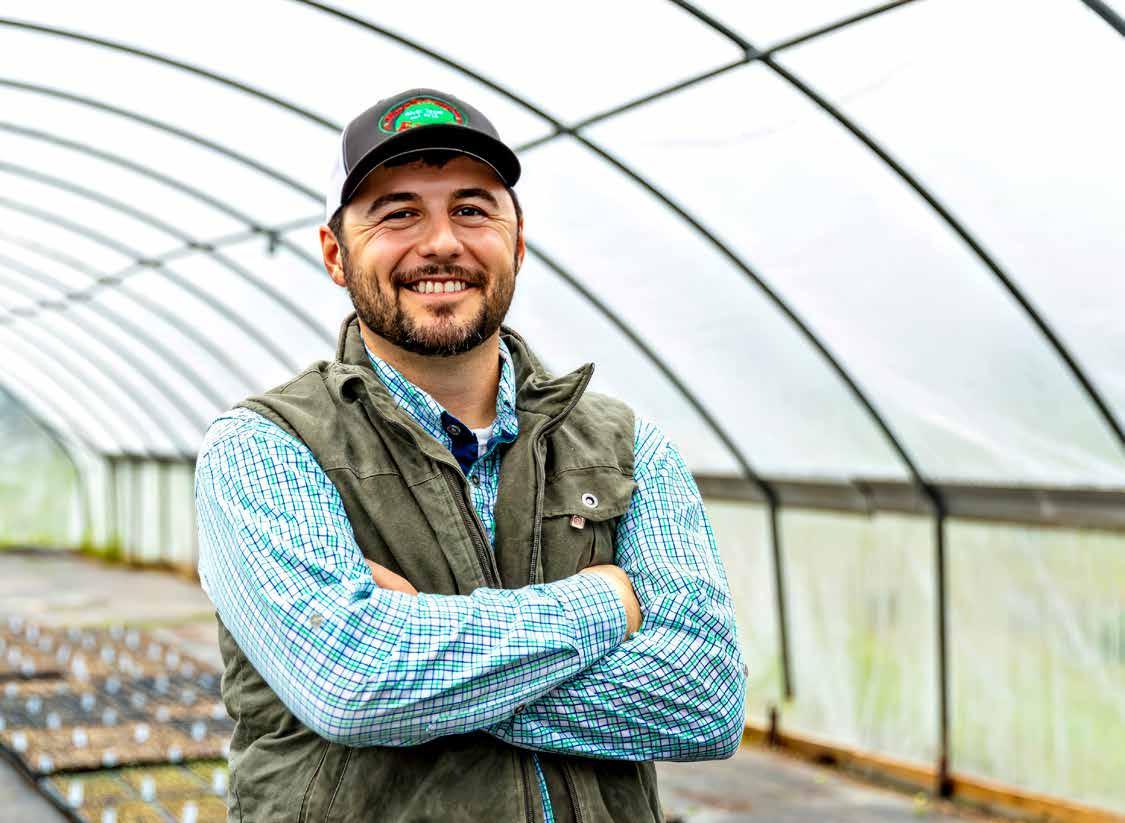
“I think I achieved something that I never thought I would through social media.”
— Tyler Froberg @farmer.froberg
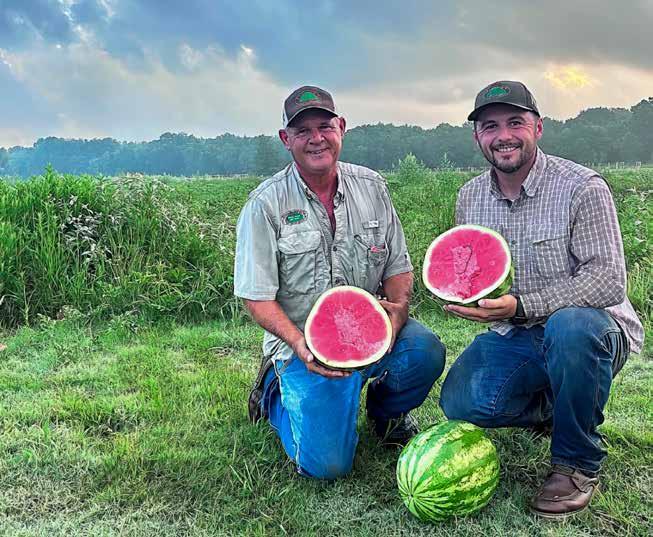
A nonprofit recognized Tyler as the person it needed to run a program teaching farm skills to fellow veterans. “When I was there, though, I missed the spark that you got with young people, whether it was seeing a seed germinate or seeing an animal being born,” he says. “While I was teaching adults, I didn’t see the same spark.”
Around that time, TikTok became popular, and Tyler got an idea. “I should make little videos, like ag lessons,” he says. “I’m still a teacher, and maybe that will scratch that itch. And so, I did.”
In the first two months, several of his videos got a respectable number of views. “I had a video hit 10,000 views, and then I had a video hit 250,000 views, and I was like, ‘Huh, there might be something to this.’”
Tyler has posted a few poems, tried growing square watermelons and loofahs, and succeeded in growing star-shaped zucchini. He’s even zipped layers of jackets to the tune of “Stand by Me” — which got over 5 million views the first time he posted it. But his favorite videos to make are any with his sons in them. “We just laugh and have fun,” he says, talking about “Little Frobergs” Dusty, Carson Lee and Tommy “Tomcat.”
“I’m not one of those content creator parents that are like, ‘No, no, no. You have to say that this way,’” he says. “It’s only been three years, and so, it’s still kind of new for us. They get excited to go out and film with me.” Tyler’s wife, Kristi, known on social media as “Momma Froberg,” also gets the occasional guest spot.
Tyler’s made plenty of silly videos. His personal favorite involves being a rubber duck farmer. “There were these rubber ducks everywhere, and it was just a lot of fun,” he says.
Despite his following on social media, Tyler doesn’t consider himself an influencer. “Influencers are putting on makeup trying to influence you to use this certain brand or product, or there are ag influencers who create content for people in the ag industry. They work with brands and influence followers to use certain brands or products, and I don’t feel like I do that.”
Tyler says there are a few stages every content creator goes through. The first step is embarrassment. “You don’t want anybody you know to know that you’re creating content,” he says.
LEFT: Tyler, right, and his uncle, Alfred Froberg, show off watermelons grown at Froberg’s Farm. BELOW: Tyler enjoys making social media videos with his sons, or, as he calls them online, “Little Farmer Frobergs.” Tyler and his son, Dustin, have fun sharing gardening lessons.
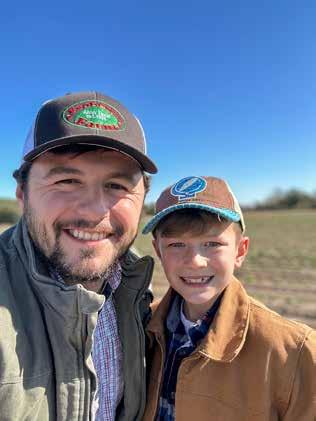
“Then comes, ‘So you’re still doing that thing?’” he says. “That’s when you see your mom and she’s like, ‘Oh, you’re still making the little videos. It’s so cute.’”
The third phase is thinking content creation is a waste of time. “You’re starting to take it more seriously,” he says, “but you’re not getting a lot out of it yet.”
Then there’s the final step — success. “For me, I got invited to give a commencement speech at a college graduation, and walking out on stage and realizing, ‘oh wait, I think I did it.’ I’m still not 100% sure, but I think I achieved something that I never thought I would through social media.”
What about those strawberry-picking machines?
“I would like to think that Lego went as far as they could with that and got hundreds of thousands of submissions for strawberry-picking machines, but I don’t know that to be true,” he says. But he planted the seed of an idea. Now it’s time to see what grows.
Tyler Froberg’s videos are available on Instagram and TikTok at farmer.froberg. His YouTube and Facebook accounts are under the name Farmer Froberg. For more on his family’s farm, go to frobergsfarm.com.
Story by MELANIE JONES
Danny Matthews and Ann Jones are among the respected and experienced members of the Rainsville business community. Both own businesses in operation for at least 40 years and credit the community for supporting them throughout.
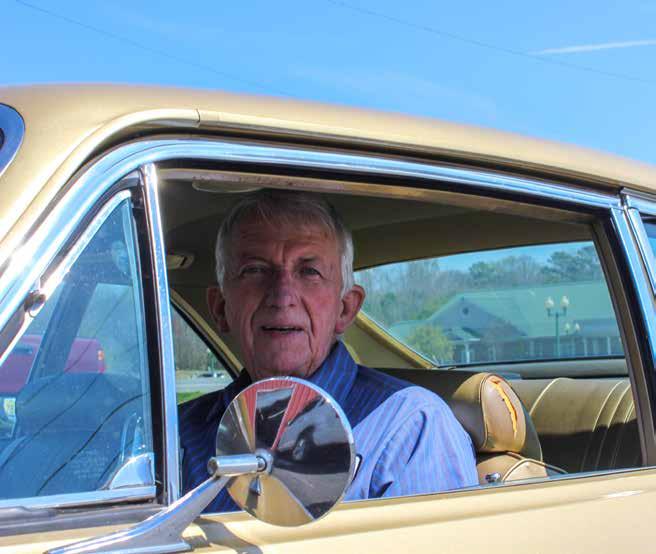
Danny Matthews started working as an auto mechanic in someone else’s shop at age 20. By age 26, he made an important discovery: “If you can make money for somebody else, you can make it for yourself.”
Now 75, Matthews has been selfemployed ever since.
He opened his current shop, Danny Matthews Garage, at 455 McCurdy Ave. N., in Rainsville in 1984. He has seen dramatic changes in the 40
years since. Back in the day, it was all about mechanics. Today, it’s all about electronics and technology.
But it’s also about reputation, and Danny has a great one. “We have many loyal customers here locally,” he says. “Some families have had three generations come by requesting services through recommendations from parents or grandparents.”
Danny, his son Randy and employee Marvin Hancock keep that reputation by staying up to date on the latest
innovations. They have access to online vehicle manuals. They couldn’t make it without FTC Fiber. “That’s pretty much essential to a business,” Danny says.
Not all that work is limited to his customers. Danny works on his own cars, too, including his baby, a gold 1970 Chevy Nova that can roar with the best hot rods around.
An outstanding mechanic in his own right, Danny is proud of Randy, who won an all-expenses paid trip to Arizona in 2015 for earning the Automotive Service Excellence Award.
After 40 years, the shop shows no signs of stalling. Danny says about 25 to 30 cars come through every week. He’s not about to do the math to figure out how many that adds up to throughout his career. “But it would be a really interesting figure to know for sure.”
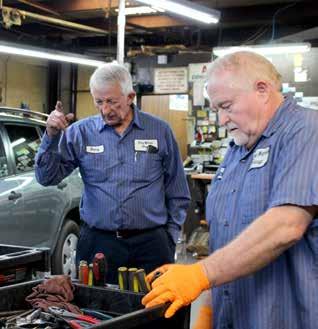
by

Ann Jones broke glass ceilings when she started her own accounting and bookkeeping business in 1970. Women business owners were uncommon in Rainsville in those days, let alone women business owners raising six children. She had the help of her husband and a loving motherin-law, but it was still a challenge.
At 84, though, she now thinks it’s time to step away from the stresses of tax season and the year-round work of business accounts, payroll and sales taxes. She’s ready for some fun.
“I plan to go to Arizona and visit my brother,” she says. That trip is set for spring because, she explains, it gets too
hot there in the summer. But her dream trip? “I really want to drive up the East Coast and go up to Maine and eat some Maine lobster,” she says. And her grandson is going to make it happen.
Melodie Coker bought Ann’s business, now named ABC Tax Preparation. While Ann keeps her hand in a few things this year, it will be her last at work. “I’ve been trying to retire for a while now,” she says. But it hasn’t stuck until this year.
“I really miss taking care of my customers,” she says. “You get to know more about people as you move with them through life.”
Her customers appreciate the family ties. Some families have had their taxes
done with her for four generations, she says, “and a lot of three generations.”
She won’t, however, miss the constant changes to the tax code and requirements.
“Oh goodness,” she says. “It’s kind of like every year, you read and study and drop off the things you’re not allowed to do anymore, then you start it all over the next year.”
Melodie had FTC come out and rewire the office for more connections and looped several computers into one network. FTC also helped her update the phone system, although she still uses the same phone number Ann has had since the beginning.
“It was my home number,” Ann says.
“Three-three-three-five. I thought it was catchy and easy to memorize.”
She was right. “Everyone on Sand Mountain knows that number,” she says.

Among summer’s many charms are vegetables and fruit blooming with flavor, and it doesn’t take a lot of effort to turn them into delicious salads.
These recipes cover all the salad bases. From crisp leafy tossed salads to sturdy mixes that can sit out for a couple hours while the kids play in the yard and you visit with friends. Keep it easy and choose a makeahead recipe featuring hearty pastas, grains and beans that can work as a side dish or a full meal, or throw together fruit or vegetable combinations that hit sweet or savory notes.
Summer salads are versatile, so feel free to swap out lettuces, and use a variety of fruits instead of just one kind. After all, it’s summertime, and the living — and cooking –should be easy.

Food Editor Anne P.
Braly
is a native of Chattanooga, Tennessee.
1 pint fresh blueberries
2 peaches, diced (leaving the skin on adds texture, vitamins and color)
2 cucumbers, sliced 1/2 cup crumbled feta cheese
3 tablespoons fresh lemon juice
1 tablespoon Dijon mustard
1 tablespoon honey
1 tablespoon olive oil
1 tablespoon finely chopped basil Kosher salt and freshly ground black pepper, to taste
In a large serving bowl combine the blueberries, peaches, cucumbers and feta.
In a jar with a lid or measuring cup combine the lemon juice, Dijon, honey, olive oil, basil, salt and pepper. Whisk together until well combined.
Pour the vinaigrette over the salad and gently mix everything together. Taste for seasoning and garnish with extra basil. Serve or cover and refrigerate the salad until ready to serve.

3 cups corn kernels (approximately 4 ears)
1 cup cherry tomatoes, quartered
1 cup cucumbers, diced
1 cup crumbled feta cheese
1/4 cup red onion, diced
3 tablespoons olive oil
3 tablespoons rice vinegar
1 tablespoon fresh parsley
Fresh basil ribbons
Kosher salt and freshly ground pepper, to taste

Bring a large pot of salted water to a boil and add the corn. Cook for 3 to 4 minutes or until the kernels turn bright yellow. Drain the corn and cool completely. Use a sharp knife to remove the kernels from the corn cob, scraping the cobs to get all the “milk” from the cobs.
In a large bowl, combine the corn kernels, cherry tomatoes, cucumbers, feta cheese and red onion. Drizzle the olive oil and vinegar over the salad.
Season generously with salt and pepper, to taste, and toss well to combine. At this point, the salad may be made ahead. Just before serving, sprinkle with fresh herbs, and toss to combine.
Grilled chicken heightens the flavor of this salad.
2 (10-ounce) packages cheese tortellini, prepared according to package instructions
2 cups shredded chicken
1 cup halved cherry tomatoes
8 ounces fresh mozzarella pearls
1 cup roasted red bell peppers, chopped into 1/2 -inch pieces
1 cup basil pesto (store-bought or homemade)
1 1/2 tablespoons extra-virgin olive oil
Fresh basil ribbons, for garnish
In a large bowl, combine the tortellini, shredded chicken, cherry tomatoes, mozzarella, roasted peppers, pesto and olive oil. Cover and refrigerate. Can be prepared up to a day ahead. When ready to serve, top with fresh basil.
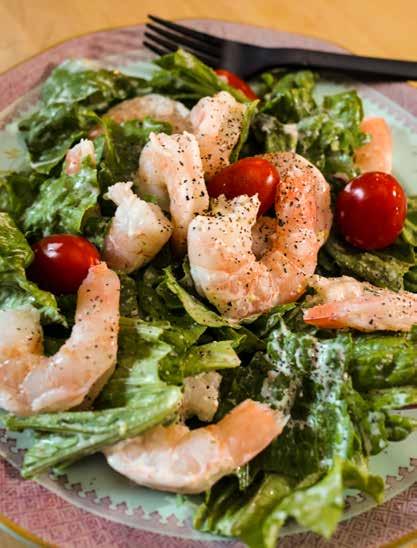
2 pounds shrimp, peeled and deveined
2 tablespoons finely chopped red onion
1 rib celery, finely chopped
Dressing:
1 cup mayonnaise
1 lemon, zested and juiced
2 tablespoons chopped fresh dill
1 tablespoon Dijon mustard
1 garlic clove, minced
1/4 teaspoon kosher salt
Pinch of freshly ground black pepper
Bring a pot of water to a boil. Add the shrimp and boil for 2 to 3 minutes, until cooked through and pink. Plunge the cooked shrimp in an ice water bath to cool. Meanwhile, make the dressing: Stir together the mayonnaise, lemon juice and zest, dill, mustard, garlic, salt and pepper. In a mixing bowl, stir together the cooled shrimp, red onion, celery and dressing, until creamy. Serve plain or nestled on butter lettuce leaves garnished with fronds of fresh dill, if desired.














